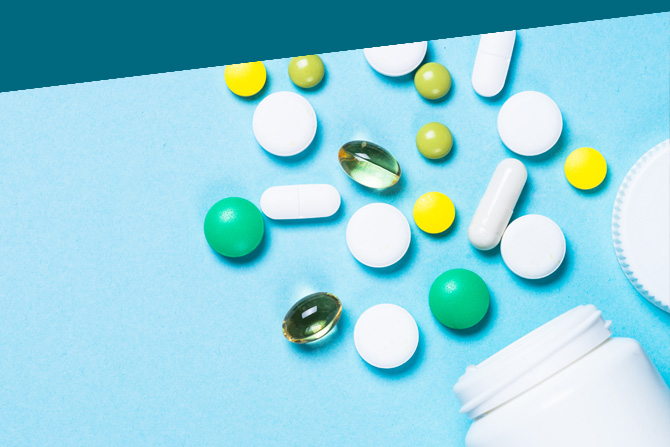Things You Should Know About Supplements
July 23, 2020

Supplements, supplements, supplements. We hear about them from advertising, informercials, self-help gurus, social media “influencers” and other sources. But we also hear a lot of questions about 1) whether they are effective and 2) whether they can be risky to our health.
With vitamin D getting widespread coverage in the news in relation to the coronavirus, we thought it would be a good time to address this topic.
A Little History Lesson
The supplements business had a key turning point when Congress passed the Dietary Supplement and Health Education Act in 1994. Prior to that time, supplements were focused on vitamins and minerals. The act addressed substances intended to “supplement the diet” and that contained “dietary ingredients.”
However, the act significantly cut back the power of the FDA. Substances with a history of use prior to the act were effectively grandfathered in. Plus, the act allowed companies to make claims about the purported impact on structure or function of the body. Moreover, there is no requirement that these substances be shown to be safe and effective prior to introduction as is the case with drugs.
Supplements Overall
First, let’s take a look at the broad category of supplements in general. As we noted above, an important point about supplements is that FDA analysis and approval are often not required or pursued. That leaves consumers on their own to determine efficacy and safety.
One of the stealthiest potential problems with some supplements is the incorporation of unreported, hidden ingredients. Here are a few:
- Sibutramine (withdrawn weight loss drug)
- Phenolphthalein (unapproved laxative ingredient)
- Fluoxetine (brand name Prozac)
- Desmethyl carbodenafil (unapproved, structurally similar to Viagra ingredient)
- Sildenafil (brand name Viagra)
- Dexamethasone a (corticosteroid)
- Phenylbutazone (discontinued NSAID)
Other additives can include anti-depressants, thyroid hormones, benzodiazepines and diuretics.
Authentic dietary supplements like multivitamins, iron, calcium, etc., are usually safe to use. But it’s wise to check with your doctor first. Other types such as botanicals can be risky.
What can happen? As just one example, weight-loss pills can cause heart palpitations, anxiety, sweating, fatigue or even kidney failure. Instances have also been reported where an individual lost his job after amphetamines were detected in a urine test. Other categories to be careful about are athletic performance and sexual enhancement products.
As with any substance, be careful when mixing a supplement with existing medications or health conditions.
Vitamins in Particular
Getting vitamins naturally through the food we eat in a well-rounded diet is typically the preferred route, and even large amounts are unlikely to be harmful. Taking them in supplement form is often where problems can arise.
A common question is whether one can actually overdose on a vitamin. One thing we do know is that, unfortunately, some people often take more than the recommended amount. That behavior can often be based on faulty information touting the vitamin of the moment to address a current situation (more on that below).
Vitamins can be divided into two main groups: water-soluble and fat-soluble. The first kind are readily passed through your body and don’t remain stored in body tissues. The main water-soluble types are C and B vitamins. Even though this type is easily excreted, taking high doses can still be dangerous with effects that can include nerve and liver damage.
Fat-soluble vitamins include A, D, E, and K. Since these can accumulate in the body, adhering to guidelines is especially important. There is usually a recommended upper intake level that should avoid harm for most people.
Effects of taking too much of a water-soluble vitamin can include abdominal pain, gastrointestinal problems, migraines, high blood pressure, impaired vision, liver damage, neurological symptoms, compromised immune system and diminished mental function.
Overdoing it with fat-soluble vitamins can lead to similar effects as well as appetite and weight loss, irregular heartbeat, elevated calcium levels leading to organ damage, blood clotting, stroke, and coma or even death.
Vitamin D and COVID-19
You’ve probably been hearing a lot about the potential use of vitamin D in regard to the coronavirus. To date, there appears to be insufficient scientific evidence indicating that vitamin D is beneficial for treating or preventing COVID-19.
Vitamin D is produced in the skin when exposed to sunlight. It assists in regulating calcium and phosphate in the body. That’s a good thing in terms of our teeth, bones and muscles.
It’s definitely important to get enough vitamin D. However, no link has been found between high dosing and COVID-19. In addition, more general studies around vitamin D levels and acute respiratory tract infections have been limited and are of questionable value.
There are wonderful substances available to help us manage and enhance our health. Do your homework, be wary of advertising claims, and consult your physician.









